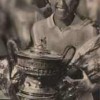Much has been written, discussed and argued on who is the greatest female tennis player of all time. Margaret Court won more major singles titles than any other woman (24) and more majors in singles, doubles and mixed (62), but Martina Navratilova, it has been argued, faced stiffer competition in her winning 59 total majors, including a final title at the age of 49. Serena Williams is in the discussion based on her amazing power and dominance in the current game. Steve Flink, in his book “The Greatest Tennis Matches of All Time” (for sale here: http://www.amazon.com/dp/B008B9CIN4/ref=cm_sw_r_pi_dp_V51Jub1SEPNM7) gives the nod to Steffi Graf with 22 major singles titles.
However, there is very little argument on who the greatest JEWISH female tennis player is. That would go to a player named Suzy Kormoczy from Hungary.
In her book “The Greatest Jewish Tennis Players of All Time” (available for sale here: http://www.amazon.com/dp/193755936X/ref=cm_sw_r_pi_dp_A41Jub0S0TAWV) Sandy Harwitt profiles the 1958 French women’s singles champion in this book excerpt below.
The search for the most accomplished Jewish woman to play tennis requires some heavy research. But persistence often pays off as it did on this occasion with the discovery that the late Hungarian player Zsuza Kormoczy qualifies as the top Jewish woman to ever play the game. What enables Kormoczy to win the nod is her status as the winner of the 1958 French Championships, making Hungary’s 1958 Sportswoman of the Year the only Jewish woman to date to win one of the four most coveted singles trophies in tennis.
Suzy Kormoczy is barely on the tip of anyone’s tongue. Most have never heard of the tennis talent and finding information about the Hungarian – there doesn’t seem to be much of an offering in Hungarian no less English — is a challenge.
Born on August 25, 1924, Kormoczy is the pride and joy of Hungarian tennis. While other Hungarians might be more familiar to tennis fans — Andrea Temesvari and Balazs Taroczy come to mind — it is “Suzy K” who is the country’s greatest success story.
By 1939, Kormoczy was traveling abroad and had the opportunity to meet tennis idols from America — Bill Tilden and Alice Marble — when at Wimbledon. She asked Marble, who would win the Wimbledon title that year with a 6-2, 6-0 win over Briton Kay Stammers, for an autograph. Marble wrote, “To Suzy, I hope you will someday win Wimbledon, Alice Marble.”
Kormoczy would never win Wimbledon — clay and not grass was her surface of choice — but she would come fairly close. The petite Hungarian would reach the Wimbledon semifinals in 1958, just weeks after winning the French title, and the quarterfinals in 1953 and 1955.
A resilient baseliner, the terre battue at Roland Garros and at other European events, was where Kormoczy performed to high standards. In 1958, following rigorous pre-Roland Garros training that included running and gymnastics, Kormoczy, at the ripe old age of 33, earned her place in history. She captured the French National crown with a 6-4, 1-6, 6-2 victory over Shirley Bloomer Brasher of Britain, becoming the oldest ever French champion, a distinction she still holds. Following behind Kormoczy as the next oldest French champions are Serena Williams (2013): 31 years, 8 months, Nelly Adamson-Landry (1948): 31 years and 6 months, and Chris Evert (1986): 31 years and 5 months.
As the defending champion in 1959, Kormoczy returned to the final, but couldn’t hoist the trophy again. She lost out to 18-year-old Englishwoman Christine Truman 6-4, 7-5, who became the youngest ever French women’s champion until she lost that honor to a 17-year-old Steffi Graf in 1987.
Although formal rankings were still decades away, sports journalists would take to ranking players on their own. And in 1958, when Kormoczy won eight of the nine tournaments she entered, losing in the Wimbledon semifinal to Briton Angela Mortimer 6-0, 6-1, it appeared unanimous that Kormoczy would occupy the No. 2 spot. At home, she was feted with the first-ever Hungarian Sportswoman of the Year award in honor of her incredible 1958 season.
In Hungary, she would win the national singles title six times, and the doubles or mixed doubles trophies on 10 occasions. She first won at home as a 16-year-old in 1940, taking the doubles and mixed doubles title.
From what is known, Kormoczy suffered with kidney stones throughout her career, which disrupted her ability to play at times. Following her career as a player, Kormoczy would become a coach at Vasas, her club, and the manager of the National Tennis Association.
Kormoczy passed away at age 82 on September 16, 2006. Tributes calling attention to her incredible life were offered by a number of players who followed her footsteps into professional tennis. Andrea Temesvari said, “This is a huge loss for the Hungarian tennis life. She belonged to the all-time greats.” Balazs Taroczy said, “The tennis and her family were her life. She loved her club, “Vasas” where I also played. I’m sorry for not being able to watch her play, but I know she was a big fighter, a wonderful player, and a great person.”
In 2007, Zsuzsa Kormoczy was posthumously inducted into the International Jewish Sports Hall of Fame.

